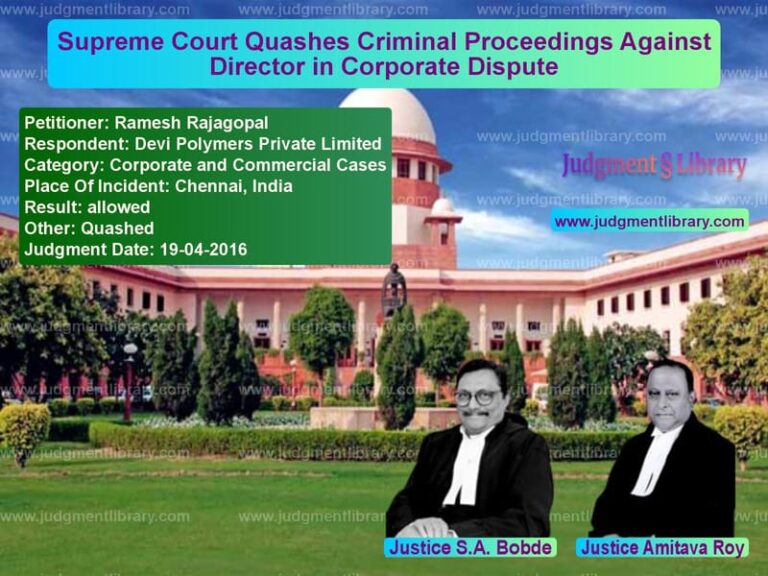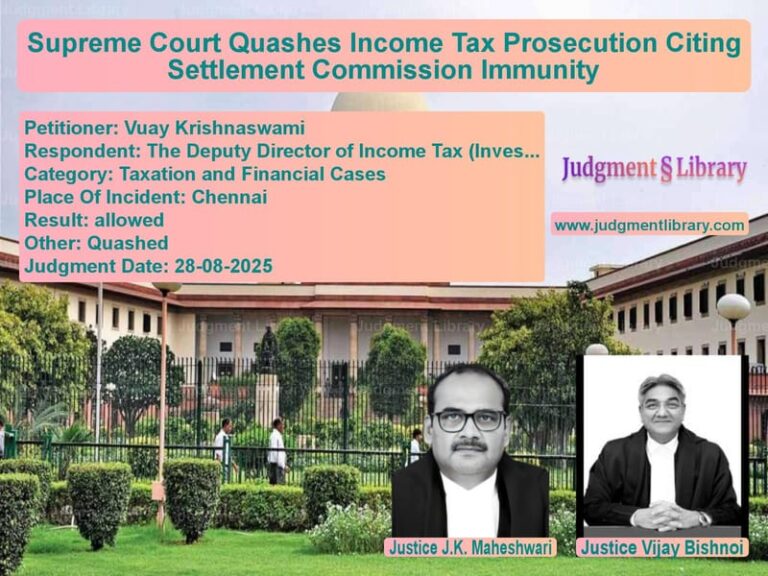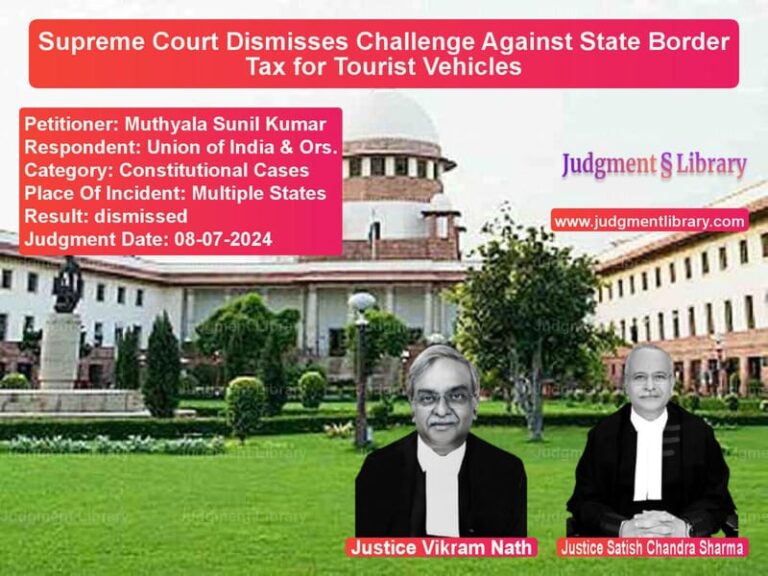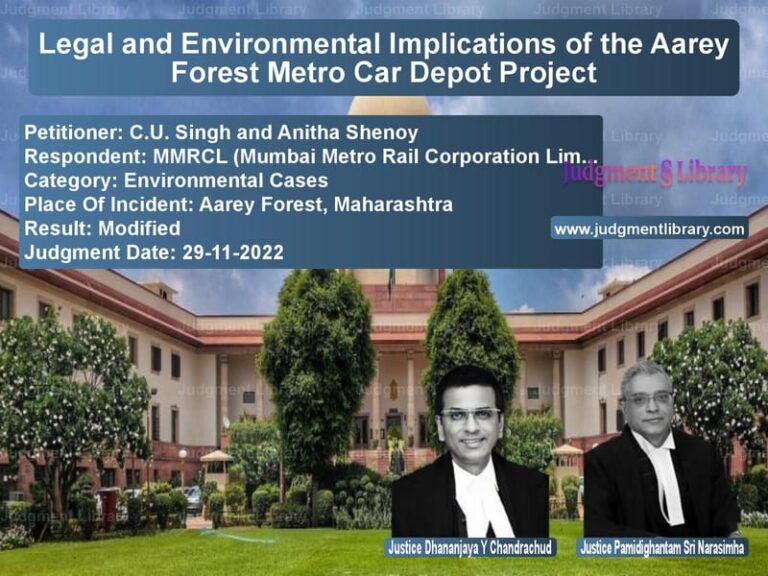Supreme Court Acquits Two Men in Maharashtra Murder Case After 10 Years in Jail
The Supreme Court of India recently delivered a significant judgment in Saheb, S/o Maroti Bhumre & Anr. vs. The State of Maharashtra, overturning the conviction of two accused who had spent over a decade in prison. The case revolved around the brutal murder of Madhavrao Krishnaji Gabare, which allegedly resulted from a long-standing political rivalry in Village Singi, Maharashtra.
The ruling reinforces the principle that an accused must be convicted only if the prosecution establishes guilt beyond a reasonable doubt. The Supreme Court carefully examined the prosecution’s case, particularly the reliability of eyewitness testimony, inconsistencies in statements, and lack of forensic evidence.
Background of the Case
On April 8, 2006, around 7:30-8:00 PM, Madhavrao Krishnaji Gabare and his family were attacked with axes and sticks at their residence. His wife, Janakibai Gabare, filed an FIR, stating that her husband died on the spot due to multiple injuries. The prosecution claimed that the attack was politically motivated, with the accused being members of a rival faction.
A total of twenty-two individuals were accused in the case. In 2008, the Additional Sessions Judge convicted nine of them, sentencing them to imprisonment. The remaining accused were acquitted. Upon appeal, the Bombay High Court acquitted six of the convicted individuals but upheld the convictions of three, including the appellants, Saheb and Sitaram.
Legal Proceedings and Arguments
Prosecution’s Case
- The attack was premeditated and driven by political rivalry.
- The accused attacked the deceased with axes and sticks.
- The widow of the deceased, along with other eyewitnesses, testified against the accused.
- The victim suffered nine severe injuries, including head trauma and intracranial hemorrhage.
Defense’s Arguments
- The identification of the accused was unreliable due to a power cut at the time of the incident.
- The primary testimony linking the accused to the crime came from a single eyewitness, who had given contradictory statements.
- Key witnesses, including the victim’s daughter-in-law, were not examined in court.
- The prosecution failed to establish guilt beyond a reasonable doubt.
Supreme Court’s Observations
Justice Sanjay Kumar, delivering the judgment, stated:
“All that the defense needs to establish is the existence of reasonable doubt for the accused to be given the benefit thereof.”
The Supreme Court found that the prosecution’s case relied almost entirely on the testimony of Janakibai (PW-1), the widow of the deceased. Her statements contained significant contradictions:
- In her initial complaint at the hospital, she claimed that all the accused attacked the victim simultaneously.
- Later, during the trial, she changed her statement, attributing the attack only to three specific individuals.
- She stated that there was moonlight, which allowed her to see the accused clearly, but she failed to specify whether it was a full-moon night.
- Her account included an incident where a child was allegedly thrown to the ground, but this detail was not mentioned in the FIR.
The Supreme Court found that these inconsistencies created a reasonable doubt, warranting the acquittal of the appellants.
Analysis of Eyewitness Testimony
The case hinged on the reliability of the testimony of Janakibai (PW-1). The Supreme Court applied the principle that testimony should be consistent and corroborated by other evidence. However, in this case:
- Other key witnesses, such as the victim’s daughter-in-law, were not examined.
- Two other eyewitnesses, Govind Gabare (PW-5) and Kamalbai Gabare (PW-4), were found unreliable by the High Court.
- The High Court itself had acquitted several accused due to lack of specificity in charges.
Key Findings and Judgment
- The Supreme Court ruled that the prosecution failed to prove the guilt of the accused beyond reasonable doubt.
- It acknowledged that political rivalry may have been a motive, but motive alone does not establish guilt.
- The conviction under Sections 148, 302, and 149 of the IPC was overturned.
- The appellants were ordered to be released immediately.
Implications of the Judgment
This judgment has far-reaching implications for the criminal justice system:
- Strengthening Due Process: The ruling reinforces that convictions must be based on strong, credible evidence.
- Protection Against False Testimony: Courts must scrutinize eyewitness accounts for inconsistencies.
- Reaffirming the Presumption of Innocence: If there is any reasonable doubt, the accused must be acquitted.
- Higher Standards for Eyewitness Testimony: Courts must ensure that testimony is reliable and corroborated by other evidence.
Conclusion
The Supreme Court’s decision in Saheb, S/o Maroti Bhumre & Anr. vs. The State of Maharashtra upholds the principle that a person should not be convicted unless their guilt is proven beyond a reasonable doubt. The ruling not only exonerates the accused but also serves as a reminder of the importance of fair trials, reliable evidence, and due process.
Petitioner Name: Saheb, S/o Maroti Bhumre & Anr..Respondent Name: The State of Maharashtra.Judgment By: Justice Sanjay Kumar, Justice Aravind Kumar.Place Of Incident: Village Singi, Maharashtra.Judgment Date: 18-09-2024.
Don’t miss out on the full details! Download the complete judgment in PDF format below and gain valuable insights instantly!
Download Judgment: saheb,-so-maroti-bh-vs-the-state-of-maharas-supreme-court-of-india-judgment-dated-18-09-2024.pdf
Directly Download Judgment: Directly download this Judgment
See all petitions in Murder Cases
See all petitions in Bail and Anticipatory Bail
See all petitions in Custodial Deaths and Police Misconduct
See all petitions in Judgment by Sanjay Kumar
See all petitions in Judgment by Aravind Kumar
See all petitions in allowed
See all petitions in Quashed
See all petitions in supreme court of India judgments September 2024
See all petitions in 2024 judgments
See all posts in Criminal Cases Category
See all allowed petitions in Criminal Cases Category
See all Dismissed petitions in Criminal Cases Category
See all partially allowed petitions in Criminal Cases Category







